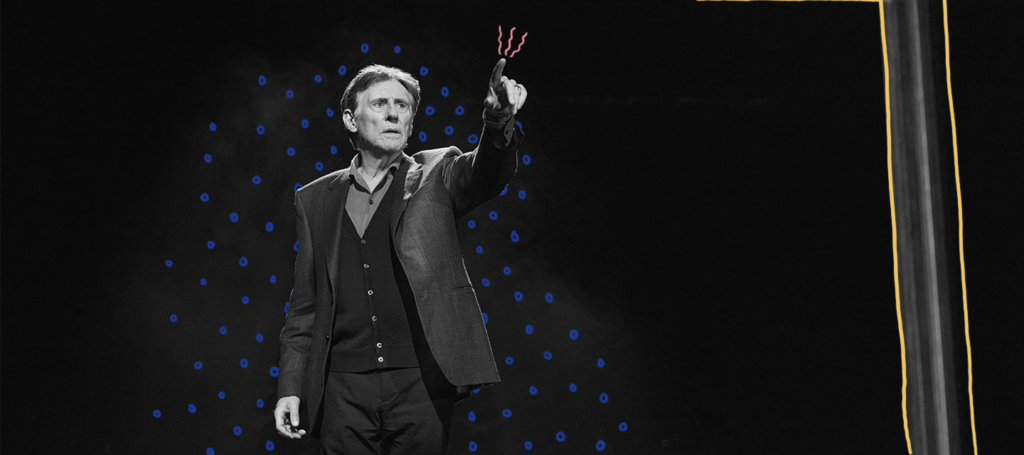


‘Walking with Ghosts’ is Forgettable, When It Should Be Haunting
This I believe to be true: theatre offers a form of time travel through storytelling. The performer becomes a spirit guide who guides us all towards meetings with ghosts of the past – in order to see more clearly the here and now.
I believe it’s with the same intention that Gabriel Byrne created his one-man show Walking with Ghosts – and in his case, we are offered glimpses into his personal ghosts. The West End transfer, written and performed by The Usual Suspects’ actor, has the structure of a live memoir consisting of snippets of the author’s life.
Byrne tells of his boyhood in Dublin, of his teenage years pursuing a purpose in England, his brush with fame as an adult, and through it all, we meet the ghosts that follow, all of which Byrne recounts the memories of, or embodies. There are fond ones, like his friends in school who stuck together as they plotted revenge against a particularly strict teacher; or his mother, who loved him without condition and became the first person who showed him what wealth looked like. His father, who wept unseen as he made his departure to seminary school; and perhaps most important, his grandmother, who introduced him to the silver screen.
There are also sorrowful ones: his friend who passed away in a drowning accident (the first time he experienced death); the priest who assaulted him as a teenager; and later on, his struggles with alcohol abuse, part of the cost of fame.
“Fame doesn’t change you,” Gabriel was taught by Richard Burton, ‘it changes the people around you.” Indeed, fame is a funny thing: it adds a layer of familiarity between strangers, and in this case, between Byrne and the audience members who attend the production hoping to get to know more about him. I felt a bit jealous of the way they were able to be moved by every choice the performer made. And yet, I also wondered whether the stories would’ve made a lasting impact had someone other than Byrne performed them.
I had little knowledge of Gabriel Byrne prior to seeing Walking with Ghosts, and because of that, my experience of hearing his story became somewhat mundane. To me, this was an experience comparable to hearing tales at a local pub – Byrne’s face which held no significance in my memory started to morph into one of Brandon Stanton’s Humans of New York portrait subjects, sharing their own personal ghosts on a park bench, or atop of suitcase in transit at Grand Central.
I’ve always had a soft spot for solo works. To me, it’s a magical experience when all a performance needs are nothing more than words from a lone storyteller. A performer who embodies a kaleidoscopic ensemble of characters from their thespian arsenal.
Having seen masterpieces of the form, like Dana H, The Encounter, or The Way She Spoke, where some of the most universally important, yet deeply personal, stories were told, I’ve grown quite critical in this unique genre of performance art. I’ve often questioned: what kind of story warrants this type of pure, intimate relationship between a performer, and each one of the countless audience members? Especially in a Broadway house. Does Walking with Ghosts warrant the kind of space and budget Broadway offers?
Something else I believe to be true: we go to the theatre to be entertained, yes, but also for our life to be changed in small ways. To become richer through the stories we’ve been told, because they commanded, nay, deserved attention. And yet, I left the Music Box Theater, where Walking with Ghosts is currently housed, feeling neither particularly entertained, nor motivated to learn more about who Bryne is.
Despite all, Walking with Ghosts is an earnest and honest piece of personal confession. Through his description and choices of what to share, I can tell that Byrne was hoping to frame himself as a narrator with a level of anonymity. A “ghost boy,” as he calls himself in the play, who holds the identity of the shy Irish boy, the awkward young man who finally felt a sense of belonging thanks to the theatre, and more versions of himself that he no longer is. But the rapt attention from his audience didn’t feel earned, by either the pacing of the piece (the 135-minute production felt slowed and segmented by the preponderance of unnecessary blackouts that broke the flow of the storytelling up) or the content. Perhaps I did, thanks to my lack of knowledge of Byrne, experience the show the way the author intended: as a skeptic who needed to be convinced to hold onto the memories of his ghosts.
Keep Reading

A Blazing Romp Through America’s Dog-Eat-Dog Butchery
Suzan-Lori Parks’ Pulitzer Prize-winning love letter to hustlers returns to Broadway in a powerful production. Although Topdog/Underdog premiered off-Broadway in a pre-9/11 United States, under Kenny Leon’s direction, this revival makes it look as if it were tailor-made for the era of betrayal and dissension we live in today. The play, set in Giuliani-era New […]
Read More
This “Piano Lesson” Hammers the Obvious Note Over Its Head
The best horror films understand that what is left unseen is more powerful than anything that could ever appear on-screen. And though August Wilson’s Pulitzer Prize-winning play, The Piano Lesson is no horror flick, when staged well, its treasure trove of invisible forces and tensions leaves even the most stoic audiences alternating between pathos, humor, […]
Read More












